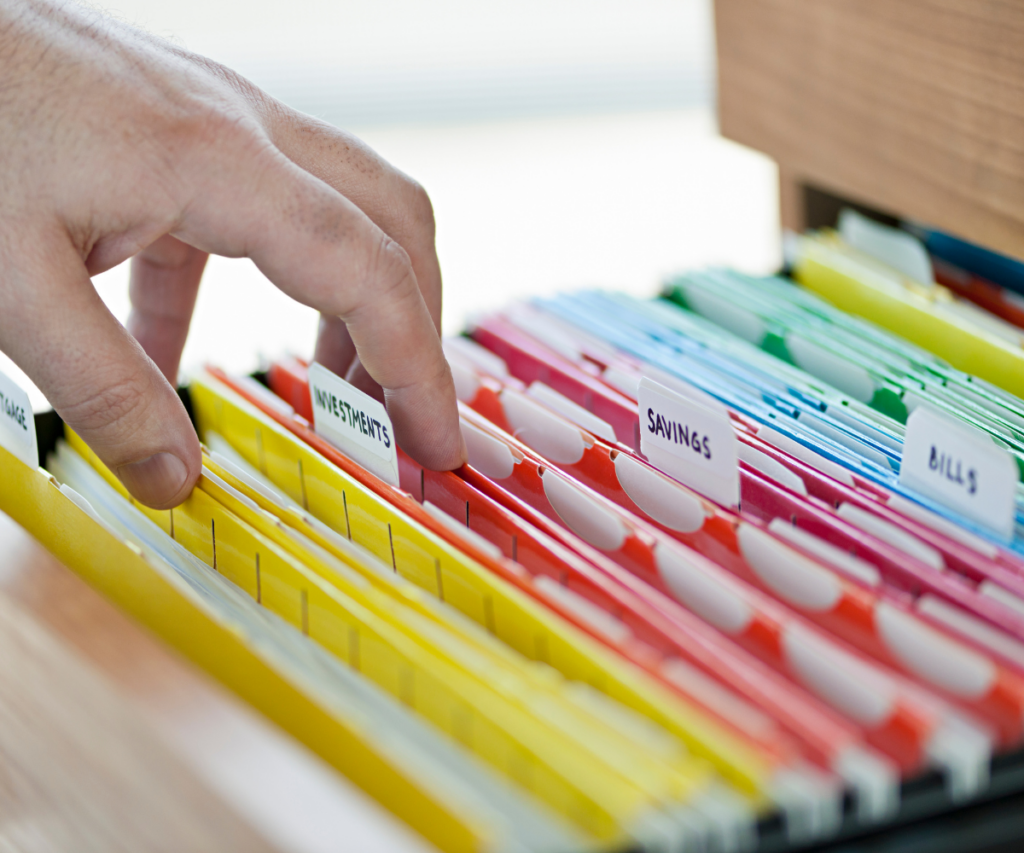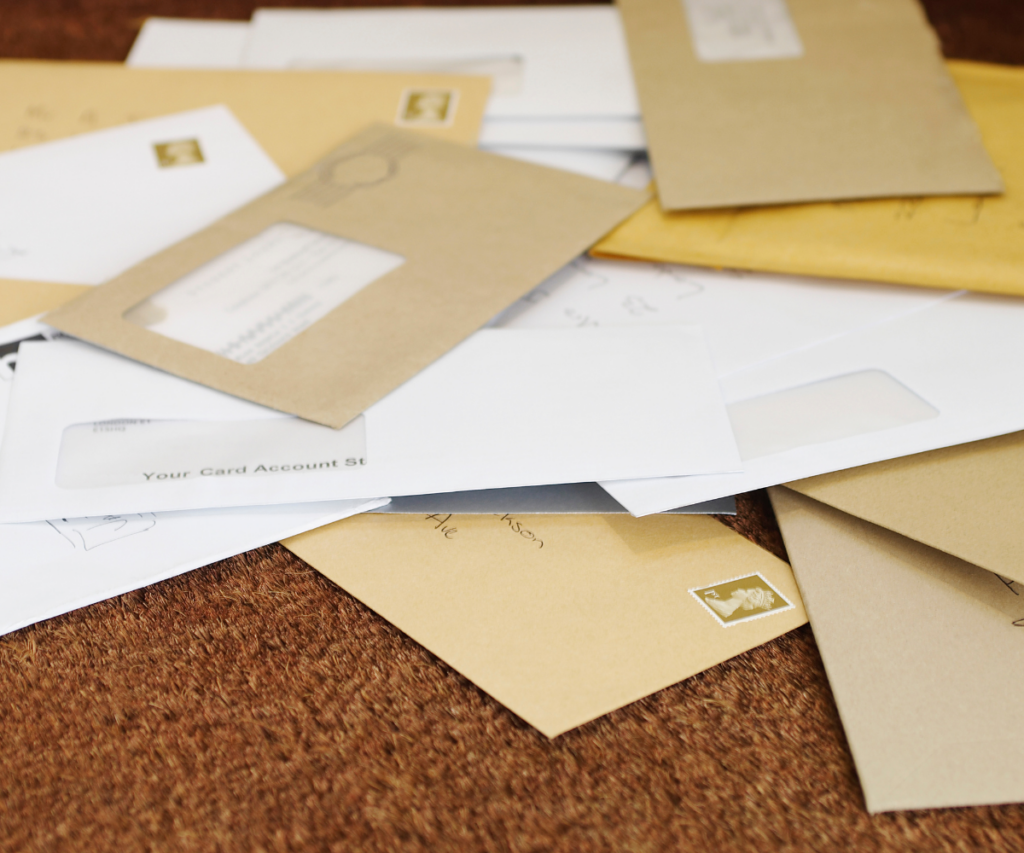Even if you don’t receive many paper bills, paperwork can pile up quickly! If you keep on putting off organizing your bills and mail, you may be surprised one day that you already have a lot of paperwork to handle.
Not only are bills and mail overwhelming, but organizing them can also take up valuable time. When you’re looking for a specific bill or document, sorting through the mountains of paper can seem impossible.
One way to deal with it is to start going through your paperwork as soon as possible. Checking your mail regularly helps ensure that you’re on top of your financial situation, and you can make sure that you pay your bills on time. It helps you from missing payment dates and incurring late fees and other penalties.
Additionally, organizing your papers keeps you informed. Regularly checking your mail will make you more likely to get updates on important notices or announcements. Instead of being blindsided, you can remember critical deadlines or tasks. It also reminds you that you need to take action on specific cases.
7 Easy Steps To Help You Organize Your Bills and Mails
That mountain of paper clutter may be daunting, but learning how to organize bills and mail properly can prevent your paperwork from accumulating and becoming unmanageable.
Here are seven steps you can take to help you quickly organize your bills and mail.
1. Collect and Categorize All of Your Bills and Mail
You may already have a big pile of papers, but it’s time to make it bigger. Gather every piece of paper in your home into one giant stack. Search every room, drawer, and storage bin to find every bill, receipt, letter, leaflet, magazine, or newspaper. Add in your most recent mail as well.
Gathering everything into a single pile may seem counterproductive. Still, it can be an effective and easy way to gain an overview of all the papers you need to sort. It also ensures that no paperwork will be left behind, preventing surprise papers from popping up. You can plan how to approach the organizing process with it all in front of you.

2. Sort Your Papers by Category and Topic
Once you’ve gathered everything, you can start sorting your papers into general categories. Common categories are bills, documents, letters, newspapers, and magazines. This helps you determine which types are most important for you, such as bills or records. This lets you immediately identify which pieces you can discard, like junk mail, newspapers, and leaflets.
Then, sort by topic. You can further break down the stacks of paperwork to see what you’re dealing with. This is also when you could create a filing system that works for you.
You can start by sorting your papers according to their type, such as:
- Legal Documents: Birth certificates of family members, passports, social security cards
- Bank Statements: Credit cards, loans, notices
- Property Documents: Leases, house deeds, rental or purchase agreements, mortgages
- Vehicle Papers: Titles, registration forms, license information
- Insurance Documents: Health insurance cards, life insurance, car insurance
- Utility Bills: Electricity, water, phone, internet, and sewage bills
- Tax Documents: Tax forms, tax returns, assessments
- Medical Records: Doctor’s notes, prescription records
- Education Documents: School transcripts, college applications, diplomas, certificates
- Income Records: Employment contracts, payments stubs, monthly salary slips
- Receipts: Purchase receipts, sales invoices
- Subscriptions: Magazines, newspapers, journals, gym memberships
3. Determine Which Papers To Keep and Throw Away
Once you sort your papers into specific groups, decide which ones to keep and which to throw away. Before throwing anything away, please check each piece to determine its importance thoroughly.
When determining which papers to keep, it is often helpful to consider how long you need to keep the paper for legal reasons, which can vary depending on the type of paper. For example, financial documents like tax forms should be kept for up to seven years as per the IRS, while you should keep important documents and medical records indefinitely.
You can also consider whether a digital copy is viable instead of keeping the physical paper. You can scan or take a picture of important documents and store them digitally, and this helps keep your physical space organized and clutter-free.
When it’s time to get rid of the ones you don’t need, check for papers with personal information, bank account details, and other sensitive data. Destroying these papers instead of throwing them away can help prevent identity theft and fraud.
For this, a paper shredder may be your best friend. Busy moms can also make paper shredding a bonding experience with their kids while teaching them the importance of protecting their data. Alternatively, you can use an identity theft protection stamp to cover sensitive information completely.
For papers without sensitive information, you can discard them in the trash. Another option is to place them in a recycling bin for a more responsible and eco-friendly disposal, if available.
4. Archive Important Papers Into a Secured File Organizer
When organizing papers, important documents are usually a top priority. You can use a single mail organizer with different sections or separate file folders to store them securely and systematically. Plus, this can help you readily retrieve essential documents when needed.
For added security, you can keep your papers in a safe or filing cabinet. Be sure to keep the keys somewhere safe and away from children’s reach. Also, you can check on the contents of your file cabinet from time to time, ensuring everything is in order.

5. Sort All Your Current Bills by Due Date
You can further organize your papers by sorting them by date. This may be especially helpful for your newer bills that you need to pay, as this allows you to stay on top of due dates and avoid late payments.
You can set up calendar reminders, to-do lists, or financial management apps to keep track of due dates. You can also set up online payment reminders and automatic payment options for regularly paid bills.
6. Sort All of Your Incoming Papers Using the New System You’ve Created
Once you’ve created a sound system that works for you, try to stick to it. When incoming mail arrives, sort it into its designated section or file folder.
This helps keep your incoming papers organized and easily accessible when needed. Following your new system helps ensure that you stay organized. Setting a specific day and time to organize your documents at least once a week is helpful.
7. Create an Overview of Your Bills and Mail
An overview of your bills and mail gives you a bird’s-eye view of your finances. You can list all your bills and their due dates and put them somewhere you can easily see and access them.
This can help you keep track of your finances and ensure that you make every bill payment on time. It also lets you create an efficient monthly budget, allowing you to plan for the future.
Additional Tips To Maintain a Paperwork Organization System
Bills and mail always keep on coming, and organizing is an ongoing task that requires upkeep. To keep your system in order, here are a few tips to remember.
Start Now
Organizing papers can be overwhelming, but it’s crucial to take that first step, no matter how small. You can make it a habit to check and sort through your incoming mail immediately to prevent them from piling up and becoming unmanageable.
It also helps to keep it simple. You don’t have to get everything in order in one day. Take your time, and try different methods until you find the system that works best for you.

Keep Them Visible
Once new papers reach your front door or mailbox, you can temporarily place them somewhere you can regularly see, such as a kitchen counter or living room table. This can remind you to sort through them and determine which ones require action, which you should store in a file, and which you can throw away. It also prevents papers from collecting on random flat surfaces in your home.
Update and Change Your System
The system you’ve created can work… until you find it no longer efficient. It’s perfectly fine to update and change your approach when needed. If one method doesn’t seem to work, try something new that can help you stay organized in the long run.
You may also need to update or add a section if the situation requires it, such as when you buy a new property or start a new business. New circumstances can mean more paperwork and require a different system, so you can make the necessary changes to keep up with the times.
Get More Organized
The steps above are already efficient ways to organize your paper. However, you can always get more organized and make the process easier.
You can use labels and folders to separate different documents further. This is especially helpful when you need to locate a particular paper quickly, saving you time and effort. Assigning specific colors to each file also helps you quickly distinguish them.
Going paperless may also be an effective way to minimize clutter and save time when looking for documents. You can create digital copies of your documents and keep them on cloud-based storage sites. This is a convenient way to organize and access your documents since many transactions are now online.
Ask for Help
Make some phone calls if you have trouble handling and organizing the papers. Your friends or family members may have better ideas for organizing paperwork. Professional organizers can also help you create and maintain an efficient organization system. Just ensure that the person you seek help from is reliable, as they will have access to sensitive documents.

 23 Brilliant Money Saving Tips for Summer
23 Brilliant Money Saving Tips for Summer